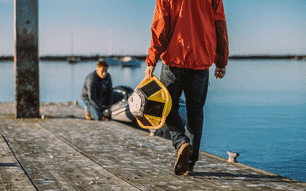Fishing has been an important employment around the Mediterranean Sea for centuries but nowadays wild fish stocks are seriously depleted and the majority of Mediterranean gilthead seabream and sea bass is produced in fish farms. The aquaculture industry is relatively new in Greece, where these two species have only been farmed since the 1980’s.
Selective breeding of many farmed fish species has progressed well, bringing substantial benefits to fish farmers in Europe – and to fish-eating consumers.
“The selective breeding efforts of Mediterranean fish species have not yet been sufficient. But we are now boosting Mediterranean fish farming as well,” said Greek biologist Konstantinos Tzokas.
Mr Tzokas is referring to FISHBOOST, a major research project whose goal is to improve the competitiveness of European aquaculture. Launched slightly over a year ago, the research project aims to ensure that in the near future, consumers on the Mediterranean shores will eat better quality fish produced through selective breeding. The project’s two Greek partners, the Andromeda Group and the Hellenic Centre for Marine Research, are engaged in research cooperation with Luke.
Big steps for fish farming
Mr Tzokas is employed in the Andromeda Group, a Greek group of companies specialising in aquaculture. The group has been running its own gilthead seabream selection programme since 2002. The programme has already created notable results: the sixth generation of fish produced through the selection programme is currently growing in the sea.
The selection programme improves the species’ ability to adapt to fish farming conditions. This means improved disease resistance and better feed efficiency which in their turn, they will benefit consumers.
“For a biologist, improved efficiency means harnessing the genetic potential of the fish to reach their full size. The better the fish are able to process their feed, the less feed goes to waste. This reduces its environmental load,” Mr Tzokas explains.
Unique cooperation
The Andromeda Group has great expectations for the FISHBOOST project. The group has already gained benefits simply by participating in a large-scale research project.
“We can use the results of our field experiments directly in our selection programmes. This gives us a slight competitive advantage,” Mr Tzokas says.
Principal Research Scientist Antti Kause develops selection programmes for farmed fish at Luke. He considers this a unique case of cooperation.
“Finnish long-running selective breeding expertise opened doors for Luke to cooperate with major European research institutes and companies. Our expertise is still growing, and research is starting to have an impact throughout Europe, all the way from fry farms to consumers,” he says.
The EU-funded FISHBOOST project aims at improving the breeding methods for the six most important species of farmed fish: common carp, European seabass, gilthead seabream, turbot, rainbow trout and Atlantic salmon.
You can read more about the FISHBOOST project in our Sustainable Aquaculture Digital, here.
FISHBOOST is calling for a producers’ perspective on aquaculture breeding and genetics. Help the project and have your say, here.




